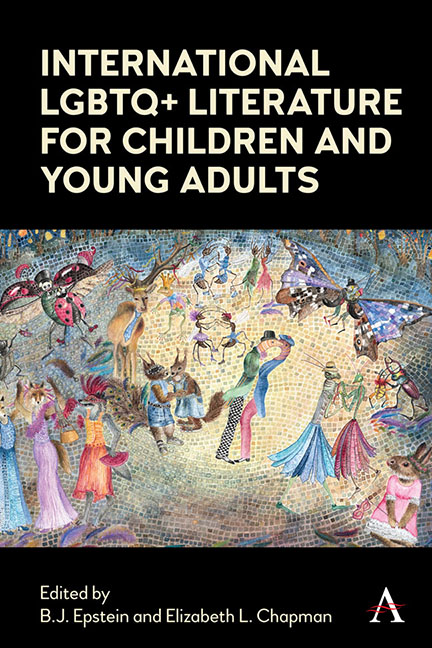Book contents
- Frontmatter
- Dedication
- Contents
- List of Illustrations
- Acknowledgements
- Notes on contributors
- Introduction
- BRAZIL
- FRANCE
- GERMANY/ AUSTRIA
- GREENLAND
- INDIA
- INDIGENOUS WRITING
- ITALY
- MULTINATIONAL
- MULTINATIONAL
- MULTINATIONAL
- THE PHILIPPINES
- SLOVENIA
- SOUTH KOREA
- SPAIN
- SWEDEN
- SWEDEN
- List of Primary Texts
- Index
Chapter One - Self-Help and Coming Out: LGBTQ+ Themes in Contemporary Brazilian Young Adult Literature
Published online by Cambridge University Press: 18 November 2021
- Frontmatter
- Dedication
- Contents
- List of Illustrations
- Acknowledgements
- Notes on contributors
- Introduction
- BRAZIL
- FRANCE
- GERMANY/ AUSTRIA
- GREENLAND
- INDIA
- INDIGENOUS WRITING
- ITALY
- MULTINATIONAL
- MULTINATIONAL
- MULTINATIONAL
- THE PHILIPPINES
- SLOVENIA
- SOUTH KOREA
- SPAIN
- SWEDEN
- SWEDEN
- List of Primary Texts
- Index
Summary
Introduction
In Brazil, the theme of differences has acquired great visibility in educational circles and in society in general over the last 20 years (Silveira et al. 2012). This is largely due to a series of cultural, political and legal changes (which are still ongoing, and which are briefly explained in the next section) promoted by various sectors, groups and social agents, similar to trends observed in other Western countries. Such changes can be identified in the criteria that have been established for selecting works in government programmes, such as the Programa Nacional Biblioteca da Escola (National School Library Programme), and Programa Nacional Biblioteca da Escola – Temático (National School Library Programme – Themes). Hence, literary works for young people selected for these programmes were reviewed according to criteria relating not only to the aesthetic and literary quality of the works and their potential to stimulate reading practices, but also in regard to the absence of prejudicial and stereotypical representations (concerning what it is like to be black, indigenous, female, homosexual, fat, etc.). This allowed the promotion of (and respect for) differences concerning ethnicity, gender, sexuality, disability, bodily features, age groups, and so on. One of the results of such trends and measures has been the proliferation, especially in the last 15 years, of literary works for young adults, deliberately written to meet the need to discuss such differences. There was an increase in the number of books addressing differences as a whole (and the enrichment resulting from diversity), with stories about black people, disabled people, old people, and so on, and also addressing the prejudice against fat people, the questioning of gender roles and so on. However, in recent years, as we will discuss later, some of these approaches in Brazilian education have been questioned from a conservative point of view.
A significant number of the demands for incorporating themes about differences in multiple dimensions of Brazilian society, among them the National Education Programmes, emerge from the activities carried out by civil society movements. Therefore, we will start this chapter by discussing the organization of social movements committed to policies concerning sexual identity in the country, aiming at delimiting the past and current historical-political conditions in which homosexuality could and may be addressed, especially in the context of the YA literature analysed here.
- Type
- Chapter
- Information
- Publisher: Anthem PressPrint publication year: 2021

